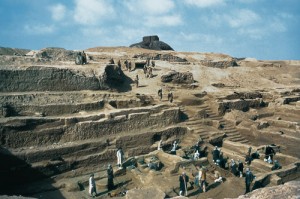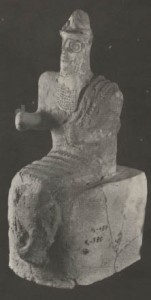The translation offered here is adapted from the one by B.R. Foster.
The Epic of Atrahasis is the fullest Mesopotamian account of the Great Flood. The conditions immediately after the Creation, when the Lower Gods have to work very hard,
The text is known from several versions: two were written by Assyrian scribes (one in the Assyrian, one in the Babylonian dialect), a third one (on three tablets) was written during the reign of king Ammi-saduqa of Babylonia (1647-1626 BCE). Parts are quoted in Tablet XI of the Epic of Gilgameš; other influences are in the Babylonian History by Berossus (quote).
(Texts: All Artifacts, Color Coding, & Writings in Bold Type With Italics Inside Parenthesis, are Added by Editor R. Brown, not the Authors, Translators, or Publishers!)
(gods in blue …mixed-breed demigods in teal…)
Complaints of the Lower Gods
[1] When the gods were man they did forced labor, they bore drudgery.
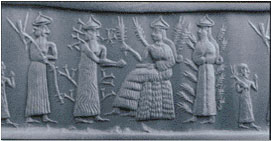
(Enlil with a plow, Haia – barley god / God of the Stores, Nisaba – Goddess of Grains & Master Scribe, Ninlil – grain goddess, & unidentified)
Great indeed was the drudgery of the gods, the forced labor was heavy, the misery too much:
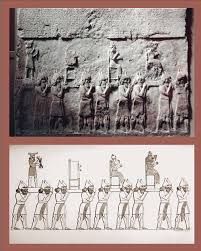 (Enlil‘s family did the work in “the Eden”; Enki‘s family worked in the mines of South Africa)
(Enlil‘s family did the work in “the Eden”; Enki‘s family worked in the mines of South Africa)
[5] the seven great Anunna-gods were burdening the [lesser] Igigi-gods with forced labor.
[Lacuna]
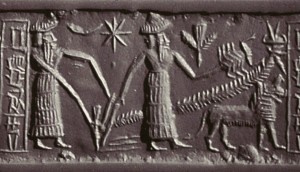 (“Eden”, prior to “modern man”, the gods did the work)
(“Eden”, prior to “modern man”, the gods did the work)
[21] The gods were digging watercourses, canals they opened, the life of the land.
The Igigi-gods were digging watercourses canals they opened, the life of the land.
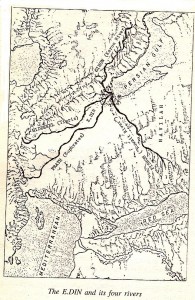
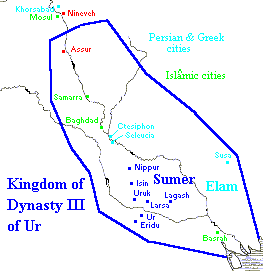 (the “Eden”, Ancient Sumer, “land of the gods”)
(the “Eden”, Ancient Sumer, “land of the gods”)
[25] The Igigi-gods dug the Tigris river and the Euphrates thereafter.
Springs they opened from the depths, wells … they established.…
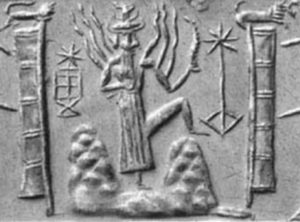
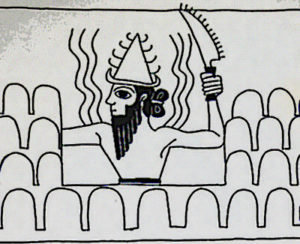 (Utu carves out launch & landing pads)
(Utu carves out launch & landing pads)
They heaped up all the mountains.
[Several lines missing]
… years of drudgery.
[35] … the vast marsh (Enki drained).
They counted years of drudgery, … and forty years, too much! (Anunnaki age 1 year = 3,6oo Earth-years)
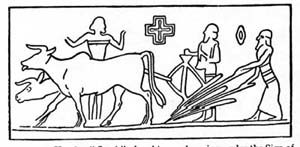 (when the gods did the work, there was much complaining)
(when the gods did the work, there was much complaining)
… forced labor they bore night and day.
They were complaining, denouncing, muttering down in the ditch:
“Let us face up to our foreman the prefect, he must take off our heavy burden upon us!
Enlil, counselor of the gods, the warrior, come, let us remove him from his dwelling;
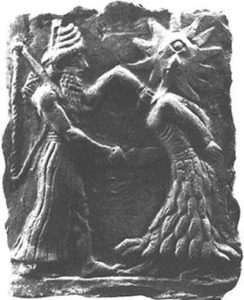 (Enlil, Earth Colony Commander, his group had it much easier in Eden than the others mining)
(Enlil, Earth Colony Commander, his group had it much easier in Eden than the others mining)
[45] Enlil, counselor of the gods, the warrior, come, let us remove him from his dwelling!”
[Several lines missing]
 (alien vs. alien, god vs. god)
(alien vs. alien, god vs. god)
[61] “Now them, call for battle, battle let us join, warfare!”
The gods heard his words: they set fire to their tools,
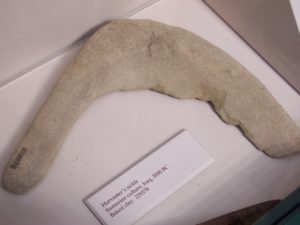 (clay sickle, like everything else, another 1st discovered in Mesopotamia)
(clay sickle, like everything else, another 1st discovered in Mesopotamia)
[65] they put fire to their spaces, and flame to their workbaskets.
Off they went, one and all, to the gate of the warrior Enlil‘s abode….
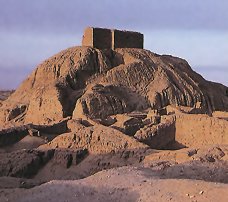
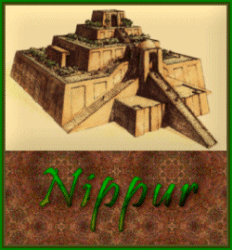 (Enlil‘s mud-brick-built ziggurat residence in Nippur)
(Enlil‘s mud-brick-built ziggurat residence in Nippur)
Insurrection of the Lower Gods
[70] It was night, half-way through the watch, the house was surrounded, but the god did not know.
It was night, half-way through the watch,
Ekur (Enlil‘s temple / residence in Nippur) was surrounded, but Enlil did not know!
[Several lines missing; the great gods send a messenger]
The Great Gods Send a Messenger
[132] Nusku (Enlil‘s son & chancellor) opened his gate, took his weapons and went … Enlil.
In the assembly of all the gods,
 (King Anu‘s descendants, directing Earth’s events)
(King Anu‘s descendants, directing Earth’s events)
[135] he knelt, stood up, expounded the command, “Anu, your father, your counselor,
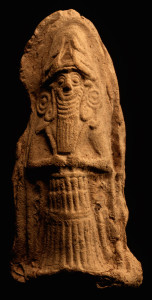
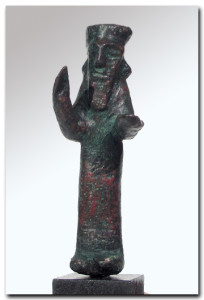
(alien planet Nibiru King Anu;, Anu‘s son & heir Enlil)
the warrior Enlil, your prefect, Ninurta, and your bailiff Ennugi have sent me to say:
[140] ‘Who is the instigator of this battle?
Who is the instigator of these hostilities?
Who declared war, that battle has run up to the gate of Enlil?
In …
[145] he transgressed the command of Enlil.'”
Reply by the Lower Gods
“Everyone of us gods has declared war; …
We have set … un the excavation, excessive drudgery has killed us,
[150] our forced labor was heavy, the misery too much!
Now, everyone of us gods has resolved on a reckoning with Enlil.”
[The great gods decide to create modern man, to relieve the lower gods from their misery.]
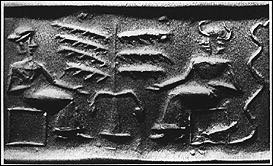 (Ninhursag & brother Enki with “Tree of Life“, alien Medical Science Engineers)
(Ninhursag & brother Enki with “Tree of Life“, alien Medical Science Engineers)
Proposals by Ea (Enki) & Belet-ili (Ninhursag)
[a1]Ea (Enki) made ready to speak, and said to the gods, his brothers:
“What calumny do we lay to their charge?
Their forced labor was heavy, their misery too much!
[a5] Every day … the outcry was loud, we could hear the clamor.
There is … Belet-ili (Ninhursag), the midwife, is present.
Let her create, then, a human, a man (workers),
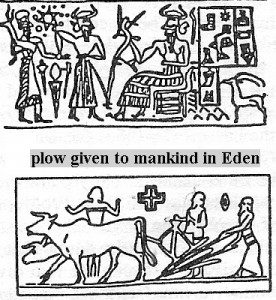 (Enlil makes decision to have earthlings bear the yoke of the gods work)
(Enlil makes decision to have earthlings bear the yoke of the gods work)
[a10] Let him bear the yoke! Let him bear the yoke!
Let man assume the drudgery of the god.”
Belet-ili (Ninhursag), the midwife, is present.
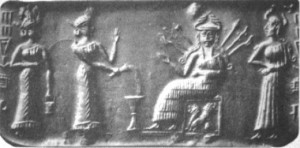
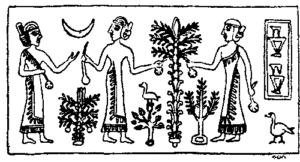 (Ninhursag & nurses)
(Ninhursag & nurses)
[190] Let the midwife create a human being!
Let man assume the drudgery of the god.”
They summoned and asked the goddess the midwife of the gods, wise Mami (Ninhursag):
“Will you be the birth goddess, creatress of mankind?
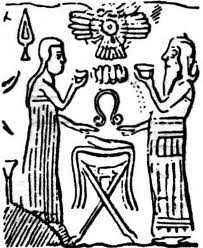
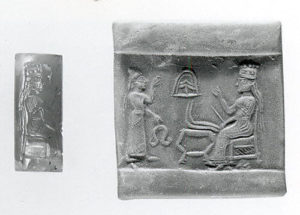 (Ninhursag in lab mixing DNA)
(Ninhursag in lab mixing DNA)
[195]Create a human being, that he bear the yoke,
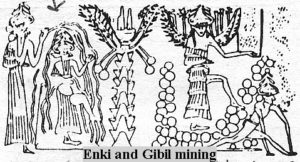
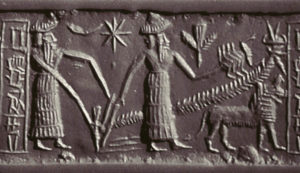
(alien Anunnaki giants tire of the burdensome labor needed to get the work accomplished for colonizing Earth)
let him bear the yoke, the task of Enlil, let man assume the drudgery of the god.”
Nintu (Ninhursag) made ready to speak, and said to the great gods:
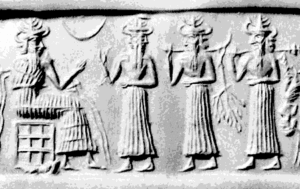
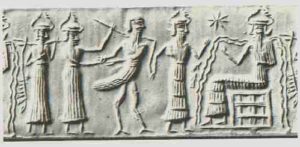
(Enki‘s DNA experiments attempting to create workers for mining, farming, etc., replacement labor for the gods)
[200] “It is not for me to do it, the task is Enki‘s.
He it is that cleanses all, let him provide me the clay so I can do the making.”
Enki made ready to speak,
[205] and said to the great gods:
“On the first, seventh, and fifteenth days of the month, let me establish a purification, a bath.
Let one god be slaughtered, then let the gods be cleansed by immerson.
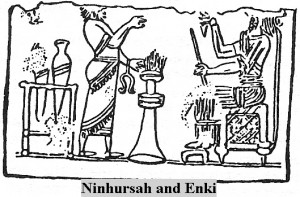
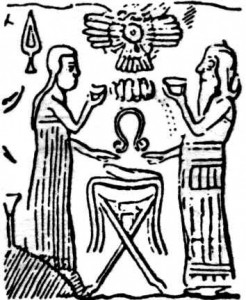
(lab work of Ninhursag & Enki, together holding Ninhursag‘s symbol, the umbilical-chord-cutter / omega / ohm, etc.)
[210] Let Nintu mix clay with his (DNA) flesh and blood.
Let that same god and man be thoroughly mixed in the clay.
Let us hear the drum for the rest of the time.
[215] From the flesh of the god let a spirit remain, let it make the living know its sign,
lest he be allowed to be forgotten, let the spirit remain.“
The great Anunna-gods, who administer destinies,
[220] answered “yes!” in the assembly.
The Creation of Man
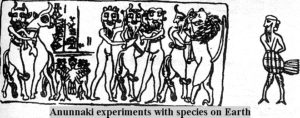
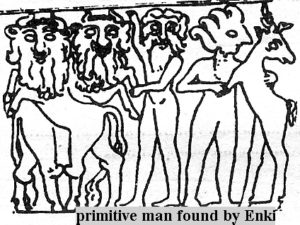
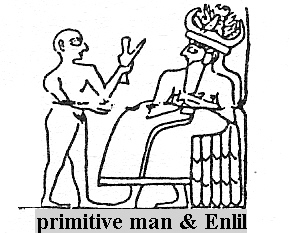 (wild man to modern man, the “missing link”)
(wild man to modern man, the “missing link”)
On the first, seventh, and fifteenth days of the month, he established a purification, a bath.
They slaughtered Aw-ilu (unidentified?), who had the inspiration, in their assembly.
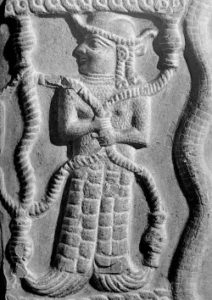
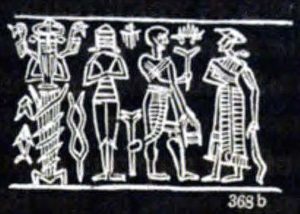
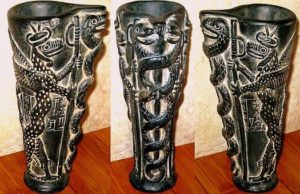
(Mesopotamian DNA symbols, giant alien gods combining the DNA of two different worlds; as the Biblical verse in Genesis, God said “Let us make man into our image & into our likeness”…)
[225] Nintu mixed clay with his flesh and blood (DNA).
That same god and man were thoroughly mixed in the clay (alien high-tech).
For the rest of the time they would hear the drum.
From the flesh of the god the spirit remained.
It would make the living know its sign.
[230] Lest he be allowed to be forgotten, the spirit remained.
After she had mixed the clay, she summoned the Anunna (Anunnaki), the great gods.

(alien giants from planet Nibiru who colonized Earth tens of thousands of years ago)
The Igigi, the great gods, spat (DNA) upon the clay.
[235] Mami (Ninhursag) made ready to speak, and said to the great gods:
“You ordered me the task and I have completed it!
You have slaughtered the god, along with his inspiration.
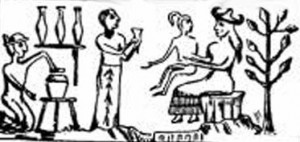 (Adapa / Biblical Adam is born, Ninhursag is successful!)
(Adapa / Biblical Adam is born, Ninhursag is successful!)
[240] I have done away with your heavy forced labor, I have imposed your drudgery on man.
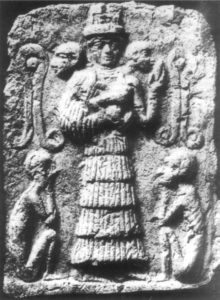 (Ninhursag & Enki worked 50,000 years to develop adequate replacement workers for the gods)
(Ninhursag & Enki worked 50,000 years to develop adequate replacement workers for the gods)
You have bestowed clamor upon mankind.
I have released the yoke, I have made restoration.”
They heard this speech of hers,
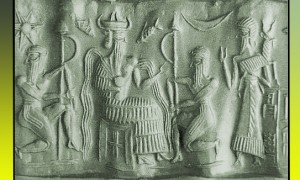 (Enki & baby Adapa / Biblical Adam in Eridu)
(Enki & baby Adapa / Biblical Adam in Eridu)
[245] they ran, free of care, and kissed her feet, saying:
“Formerly we used to call you Mami, now let your name be Belet-kala-ili (Mistress of all the gods)!”
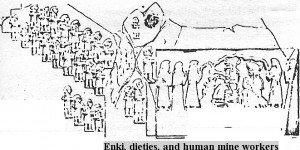 (earthling workers become available to serve the gods)
(earthling workers become available to serve the gods)
[The population increases and their noise disturbs the gods, who decide to wipe out mankind. The god Enki, however, sends a dream to Atrahasis.]
[i.b35] Enlil committed an evil deed against the people.
[i.c.11]Atrahasis (Noah) made ready to speak, and said to his lord:
“Make me know the meaning of the dream, let me know, that I may look out for its consequence.”
 (Enki informs Noah of the impending doom through a reed wall)
(Enki informs Noah of the impending doom through a reed wall)
[i.c15] Enki made ready to speak, and said to his servant:
“You might say, ‘Am I to be looking out while in the bedroom?’
Do you pay attention to message that I speak for your:
[i.c20] ‘Wall, listen to me! Reed wall, pay attention to all my words!
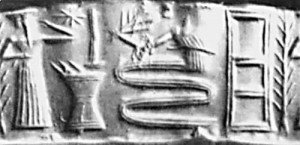
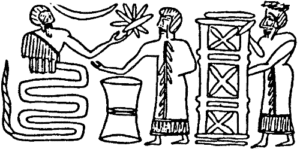
(Mesopotamian artifacts of the original stories of “Noah‘s Flood”, written 1,000+ years prior to Books of Moses)
Flee the house, build a boat, forsake possessions, and save life.
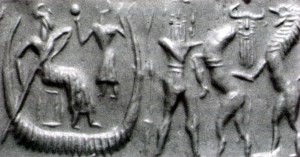 (boatman assists Gilgamesh in his travels to Noah)
(boatman assists Gilgamesh in his travels to Noah)
[i.c25] The boat which you build … be equal …
…
…
Roof her over like the depth,
[i.c30] so that the sun shall not see inside her (submergeable boat).
Let her be roofed over fore and aft.
The gear should be very strong, the pitch should be firm, and so give the boat strength.
I will shower down upon you later
[i.c35] a windfall of birds, a spate of fishes.'”
He opened the water clock and filled it, he told it of the coming of the seven-day deluge.
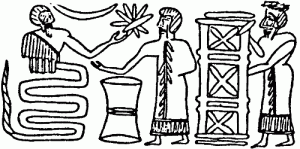
(Ningishzidda, water clock, Noah, reed wall, & Enki behind it, Enki‘s warning of the upcoming flood, arranged by Enlil)
Atrahasis and the Elders
Atrahasis received the command.
He assembled the Elders at his gate.
[i.c.40 ]Atrahasis made ready to speak, and said to the Elders:
“My god does not agree with your god, Enki and Enlil are constantly angry with each other.
They have expelled me from the land.
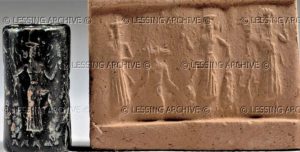 (Enki scolded by Enlil for protecting Noah)
(Enki scolded by Enlil for protecting Noah)
[i.c45] Since I have always reverenced Enki (Noah‘s father), he told me this.
I can not live in …
Nor can I set my feet on the earth of Enlil.
I will dwell with my god in the depths (Enki‘s zone, the abzu).
[i.c50] This he told me: …”
Construction of the Ark
[ii.10] The Elders …
The carpenter carried his ax, the reedworker carried his stone,
the rich man carried the pitch, the poor man brought the materials needed.
[Lacuna of about fifteen lines; the word Atrahasis can be discerned.]
Boarding of the Ark
Bringing …
[ii.30] whatever he had …
Whatever he had …
Pure animals (reproducing, non mixed creatures) he slaughtered, cattle …
Fat animals he killed.
Sheep …he choose and brought on board.
[ii.35] The birds flying in the heavens, the cattle and the … of the cattle god,
the creatures of the steppe, … he brought on board …
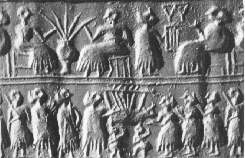 (Sumerian feast & celebration)
(Sumerian feast & celebration)
[ii.40] he invited his people … to a feast … his family was brought on board.
While one was eating an another was drinking,
[ii.45] he went in and out; he could not sit, could not kneel,
for his heart was broken, he wait retching gall.
Departure
The outlook of the weather changed.
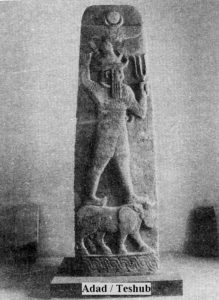 (Adad, thunder god with his high-tech alien weaponry, winged flying disc above, Taurus the Bull below)
(Adad, thunder god with his high-tech alien weaponry, winged flying disc above, Taurus the Bull below)
[The storm god] Adad began to roar in the clouds.
[ii.50] The god they heard, his clamor.
He brought pitch to seal his door.
By the time he had bolted his door,
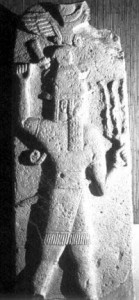
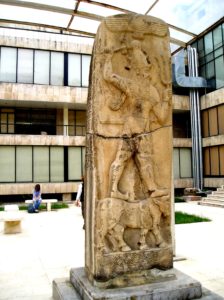 (Adad, Enlil‘s son, with his advanced alien weaponry)
(Adad, Enlil‘s son, with his advanced alien weaponry)
Adad was roaring in the clouds.
The winds were furious as he set forth,
[ii.55] He cut the mooring rope and released the boat.
[Lacuna]
The Great Flood
[iii.5] … the storm … were yoked Anzu rent the sky with his talons,
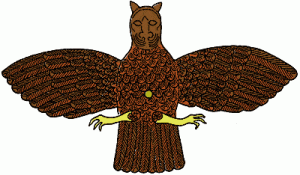
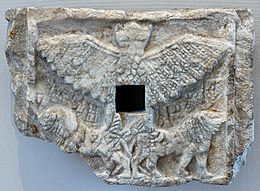 (Anzu as a bird)
(Anzu as a bird)
He … the land
[iii.10] and broke its clamor like a pot.
… the flood came forth.
Its power came upon the peoples like a battle, one person did not see another,
they could not recognize each other in the catastrophe.
[iii.15] The deluge bellowed like a bull,
The wind resounded like a screaming eagle.
The darkness was dense, the sun was gone, … like flies.
[iii.20] the clamor of the deluge.
[Lacuna. The gods find themselves hungry because there are no farmers left and sacrifices are no longer brought. When they discover that Atrahasis has survived, they make a plan to make sure that the noise will remain within limits: they invent childbirth, infant mortality, and celibacy.]
Mankind Punished
[iii.45] Enki made ready to speak, and said to Nintu the birth goddess:
“You, birth goddess, creatress of destinies, establish death for all peoples!
…
[iii.d1] “Now then, let there be a third woman among the people,
among the people are the woman who has born and the woman who has not born.
Let there be also among the people the pasittu (she-demon):
[iii.d5] let her snatch the baby from the lap who bore it.
And establish high priestesses and priestesses,
let them be taboo [celibate], and so cut down childbirth.
Note:
Belet-ili (‘mistress of the gods’), Nin-tu (‘birth-giver’), and Mami are different names for the same goddess, Ninhursag
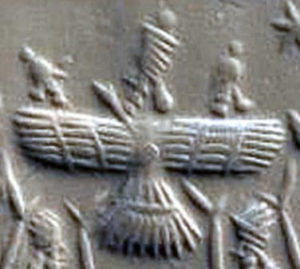 (Enlil, Anu, & Enki in their sky-disc)
(Enlil, Anu, & Enki in their sky-disc)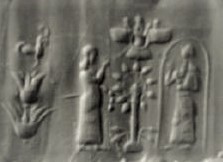 (Enlil, Anu, & Enki flying like birds above)
(Enlil, Anu, & Enki flying like birds above) 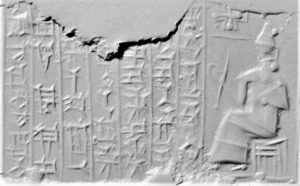 (Marduk)
(Marduk)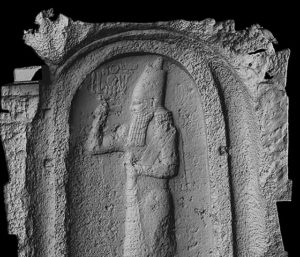 (wall relief of Esarhaddon)
(wall relief of Esarhaddon) 


















































